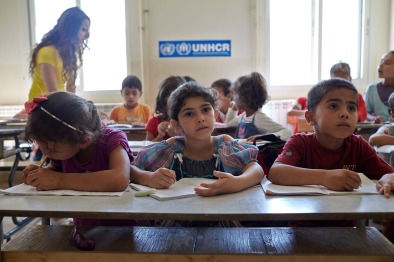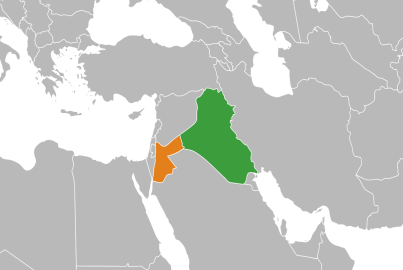Walking into the small room plastered with children’s’ artwork and school assignments proudly on display, I realized that it was only months ago that I had last stood in the same spot.

Just a few months. Yet so much had changed. I, the volunteer who once knew little more than the Arabic alphabet, could now carry out full conversations and get around. Nine year old Abeer*, who had been painfully shy, was now chatty and enthusiastic. Eight year old Mohammed*, who could once only complete a self-introduction in English, was now nearly fluent.
Saturday was my first time in the new school year tutoring refugee children with the Interfaith Action of Central Texas (iACT). Just two hours in the small room, surrounded by eager children and friendly volunteers was enough to remind me why this was my favorite weekly activity.
We started the day off by playing a game with the students to get them comfortable, and then headed inside for the lessons. There were four children from Afghanistan, who were complete beginners, so I worked with two of them on alphabet worksheets. The other five children, all Iraqi, were familiar faces who I had met and worked with the previous year (amongst them Abeer and Mohammed). The Iraqi children, who had once been doing the same alphabet tracing worksheets, were now working on spelling and sentence formation.
I could go on talking about the assignments, the enthusiastic Pictionary competition, or the spirited game of tag at the end, but instead, I want to reflect on the experience, and some of the things I learnt or noticed:
1) Language barriers are more real than ever. When I was volunteering as a tutor at the iACT summer camp, there were always interpreters or at least students who could translate for others. I came into the tutoring session thinking that my Arabic would be enough; little did I know that the students that needed the most help were from Afghanistan, and only spoke Farsi. Thus, Google Translate was a staple, and the lack of audio or transliteration for Persian meant that I had to put my Arabic skills to use to read the Farsi translations (Farsi uses the same script).

2) The Iraqi Arabic dialect is very different from the Jordanian dialect, but it’s not unintelligible! This was a really exciting discovery! I had always thought that I would not be able to understand any conversations in the Iraqi dialect, but I could actually comprehend a significant portion. Fun fact: Instead of saying “ismak” (your name) they say “ismach”.

3) Arabic is a last resort– not meant for general communication. With all the Arabic speaking students around me, I was really tempted to use the language and make conversation. However, I had to remind myself that these were English classes, and seeing as these students were able to clearly express themselves in English, I should save my Arabic only for when it was needed. While I am so happy that these students have learnt so much, I somewhat do (maybe selfishly) hope that a student will come about, so that I can really put my developing language skills to use.
Overall, the tutoring session on Saturday went very well and I can’t wait for the subsequent weeks! Hopefully, as things pick up pace, I will have some nice anecdotes and experiences to reflect on!
* Names of students changed for privacy
It is great that you are enjoying so much may be it is field. Keep it up
LikeLiked by 1 person
Thank you!!!!!!
LikeLike
That sounds like a lot of fun. Keep up the good work!!🤩
LikeLike